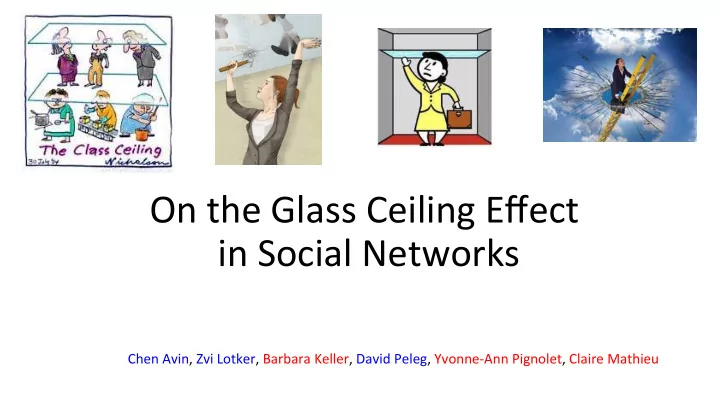

On ¡the ¡Glass ¡Ceiling ¡Effect ¡ ¡in ¡Social ¡Networks ¡ ¡ Chen ¡Avin, ¡Zvi ¡Lotker, ¡Barbara ¡Keller, ¡David ¡Peleg, ¡Yvonne-‑Ann ¡Pignolet, ¡Claire ¡Mathieu ¡
What ¡is ¡the ¡paper ¡about? ¡
What ¡is ¡the ¡main ¡goal ¡of ¡the ¡paper? ¡
What ¡are ¡the ¡basic ¡social ¡concepts ¡you ¡use? ¡ ¡
“rich ¡get ¡richer” ¡
Homophily ¡ Homophily ¡(i.e., ¡"love ¡of ¡the ¡same") ¡is ¡the ¡tendency ¡of ¡ individuals ¡to ¡associate ¡and ¡bond ¡with ¡similar ¡others. ¡
minority ¡
Can ¡you ¡give ¡an ¡example? ¡ Student-‑Mentor ¡graph ¡in ¡academia ¡ ¡
What ¡is ¡the ¡main ¡contribuTon ¡of ¡the ¡paper? ¡
Why ¡is ¡there ¡a ¡glass ¡ceiling? ¡ ¡ Graph ¡G(n) ¡with ¡nodes ¡= ¡people, ¡node ¡colors ¡= ¡gender, ¡ ¡ edges ¡= ¡advisor-‑advisee ¡relaTon, ¡degree=status ¡ ¡ ¡ 1. ¡Rich ¡get ¡richer ¡= ¡preferenTal ¡aXachment ¡ 2. ¡Homophily ¡= ¡new ¡nodes ¡prefer ¡to ¡link ¡to ¡same ¡color ¡node ¡ 3. ¡Minority ¡= ¡new ¡nodes ¡have ¡random ¡color, ¡biased ¡towards ¡males ¡ ¡ Results ¡ ¡ 1. ¡G(n) ¡built ¡using ¡all ¡three ¡assumpTons ¡ è ¡glass ¡ceiling ¡effect. ¡ 2. ¡G(n) ¡built ¡using ¡only ¡two ¡of ¡these ¡assumpTons ¡ è ¡no ¡glass ¡ceiling ¡effect. ¡
Glass ¡ceiling • Wikipedia: ¡ The ¡unseen, ¡yet ¡unbreakable ¡barrier ¡that ¡keeps ¡minoriTes ¡and ¡women ¡from ¡ rising ¡to ¡the ¡upper ¡rungs ¡of ¡the ¡corporate ¡ladder, ¡regardless ¡of ¡their ¡ qualificaTons ¡or ¡achievements. ¡ ¡ • Our ¡definiTon: ¡ ¡ Random ¡graph ¡sequence ¡ G(n) ¡with ¡node ¡colors. ¡Glass ¡ceiling ¡effect ¡for ¡Color ¡ r ¡ if: ¡there ¡exists ¡an ¡increasing ¡funcTon ¡ K(n) ¡ such ¡that ¡ � 𝑄𝑠[𝐷𝑝𝑚𝑝𝑠(𝑤) = 𝑠 | 𝑒𝑓𝑠𝑓𝑓 ( 𝑤 )≥ 𝐿(𝑜)] à ¡0 ¡
What ¡is ¡the ¡formal ¡model? ¡
Formal ¡evolu7onary ¡model ¡G(n, ¡r, ¡ρ) ¡ Bias ¡preferen7al ¡a@achment ¡model 1. New ¡node ¡(student) ¡arrive, ¡with ¡random ¡color ¡ ¡ • Red ¡with ¡probability ¡r ¡< ¡1/2 ¡ ¡ • Blue ¡with ¡probability ¡1-‑r ¡ 2. Select ¡a ¡neighbor ¡( advisor ) ¡according ¡to ¡preferenTal ¡ aXachment ¡ ¡ 3. Check ¡neighbor ¡color ¡(homophily): ¡ ¡ • Same ¡color ¡for ¡student ¡and ¡advisor: ¡accept ¡advisor ¡ ¡ • Different ¡color: ¡accept ¡with ¡probability ¡ρ, ¡otherwise ¡go ¡to ¡step ¡2. ¡
Formal ¡Results ¡1 ¡ ¡ Theorem: ¡ Let ¡0 ¡< ¡r ¡< ¡½ ¡and ¡If ¡0 ¡< ¡ρ ¡< ¡1 ¡then ¡G(n, ¡r, ¡ρ) ¡exhibits ¡both ¡glass ¡ ceiling ¡and ¡power ¡inequality ¡ ¡effects ¡(for ¡any ¡starTng ¡condiTon). ¡ ¡
Formal ¡Results ¡2 ¡ ¡ Theorem: ¡ G(n, ¡r, ¡ρ) ¡will ¡not ¡have ¡glass ¡ceiling ¡effect ¡in ¡the ¡following ¡cases: ¡ 1. If ¡the ¡rate ¡r ¡= ¡½ ¡ ¡(and ¡for ¡any ¡value ¡of ¡ρ). ¡ 2. If ¡ρ ¡= ¡0 ¡or ¡ρ ¡=1 ¡(and ¡for ¡any ¡value ¡of ¡r). ¡ 3. If ¡a ¡new ¡vertex ¡at ¡Tme ¡t ¡selects ¡its ¡advisor ¡uniformly ¡at ¡random ¡ from ¡all ¡nodes ¡at ¡Tme ¡t-‑1 ¡(and ¡for ¡any ¡value ¡of ¡r ¡and ¡ρ). ¡
Tell ¡me ¡about ¡the ¡proof ¡idea? ¡
Main ¡steps ¡in ¡proving ¡glass ¡ceiling ¡effect 1. Stability ¡of ¡total ¡degrees ¡(independent ¡of ¡starTng ¡condiTon) ¡ 2. High ¡probability ¡convergence ¡ ¡ 3. Power ¡law ¡degree ¡distribuTon ¡of ¡each ¡gender ¡ ¡
Biased ¡preferen7al ¡a@achment 1 ρ r 1-‑ρ ¡ 1-‑ρ ¡ 1-‑r ¡ ρ 1
Any ¡connecTon ¡to ¡real ¡life? ¡
Experimental ¡results ¡– ¡DBLP ¡– ¡colors ¡ ¡
Experimental ¡results ¡– ¡DBLP ¡– ¡female ¡frac7on ¡
Experimental ¡results ¡– ¡DBLP ¡– ¡glass ¡ceiling ¡ ¡
Experimental ¡results ¡-‑ ¡DBLP ¡-‑ ¡homophily
Open ¡quesTons? ¡
Thank ¡you! ¡
Power ¡Inequality ¡in ¡social ¡network • Aunfair ¡situaTon, ¡in ¡which ¡some ¡groups ¡in ¡society ¡have ¡more ¡money, ¡ opportuniTes, ¡power ¡etc ¡than ¡others ¡ • Def: ¡We ¡say ¡that ¡a ¡graph ¡sequence ¡ G(n) ¡has ¡a ¡power ¡ inequality ¡effect ¡for ¡the ¡nodes ¡of ¡type ¡ r ¡if ¡there ¡exists ¡a ¡constant ¡ c ¡< ¡1 ¡ such ¡that, ¡for ¡ n ¡large ¡enough ¡ ¡ 𝐹[𝑒𝑓𝑠𝑓𝑓 ( 𝑤 ) ¡| 𝐷𝑝𝑚𝑝𝑠(𝑤) = 𝑠] ≤ 𝑑 ¡ 𝐹 [ 𝑒𝑓𝑠𝑓𝑓 ( 𝑤 )] ¡
Recommend
More recommend